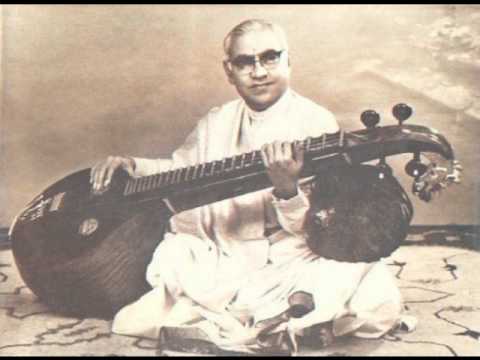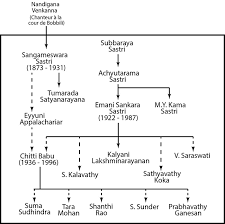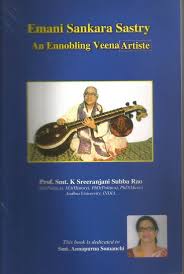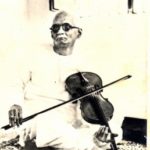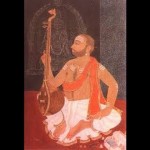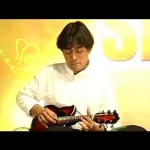Our next article in our Continuing Series on Andhra Personalities, is one who deftly managed to stand tall in both the saastriya and cinematic worlds. He was a veena instructor and veena player extraordinaire: Emani Sankara Sastri.
Background
Emani Sankara Sastri gaaru was born on September 23, 1922, at Draksharamam in modern Andhra Pradesh. His father was Emani Achyuta Rama Sastri, who was also young Sankara’s music instructor, and a saastraajna in his own right. He came from a distinguished musical lineage, as even Sankara’s grandfather Subbayya Sastri, was also an highly respected vainika. Subbayya’s scion would graduate from P.R. College, Kakinada, before making his name as a musician.
“Shri Sankara Sastri made his debut as a soloist at a very young age. Through the years he…developed a distinct style of his own on the veena.” [1]
Nevertheless, his musical career truly launched with a 1940 performance for All India Radio, Tiruchirapalli. [4] His trademark was his innovation, creativity, and soft plucking of strings, which marked his style. He was a virtuoso who composed and conducted orchestras (vaadhyabrnda) as well.
“He had a stint as a Music Director in the Gemini Studios before joining the All India Radio, where he served in various capacities, such as Chief Producer, Director of the National Orchestra (Vadya Vrinda) and Producer, Emeritus. His brilliant creations include Asara Sikharohanam, Venu Pranayam and Sowmya Purusha.” [4]
It is rare for a rigorously trained classical musician to straddle both the cinematic and sangeetha sabha worlds. And yet, Emani Sankara Sastri managed to be both orthodox and innovative. It is a testament to his musical abilities and commitment to advance the cause of culture, that he managed to do both. Indeed, there is a lesson to mukharis, rasikas, and sahrdayas alike in the patronage of music and the preservation of tradition. Culture is not static, and this divine musician of Draksharamam proved this with his own life and contribution to Andhra and Bharatiya Samskruthi. Saastriya Sangeeta stands tall in AP today through his life and legacy.
This musical legend passed away on December 22, 1987.
Achievements
https://www.youtube.com/watch?v=5fjj37VgRPA
- Awarded the Padma Sri
- Sangeet Natak Akademi Award
- Director of Akashvani Vadya Vrinda (National Orchestra), Delhi
- Guru to Maestros like Veena Chitti Babu
- Served as music director in many Telugu, Tamil, & Hindi Films
- Honorary Doctorate, Andhra University
- Aasthaana Vidhvaan at TTD
A litany of awards and titles herald the life and achievement of Emani Sankara Sastri gaaru. His musical production spanned both cinematic and orchestral worlds. He was a recognised music director not only in his native Telugu, but also in Tamil and Hindi as well. He had a number of Hindi operas to his credit. General compositions such as Asara Sikharohanam, Venu Pranayam and Sowmya Purusha are remembered to this day, as well as Svarna Tarangini.
He reached Pan-India attention with his status as Director of India’s National Orchestra. However, Sastri gaaru most famously reached international attention when he was personally invited to perform in Paris by none other than illustrious conductor, Yehudi Menuhin. He was called chaturdandi panditaha by the Vice President of India. Others titled him Maha Mahopadhyaaya.
Despite the paucity of Padma awards to the Telugu states, perhaps the greatest recognition of Padma Sri Emani Sankara Sastri was that of Aasthaana Vidhvaan at Tirumala Tirupati Devasthanams.
“Sastry was a great composer, administrator and film-music director. He played alongside musicians like Pandit Ravi Shankar, Ustad Abdul Halim Jaffer Khan and Pandit Gopal Krishan. As ‘music director’ of Gemini Studios in Chennai, Sastry directed music for Telugu and Tamil films besides Hindi hit movies.” [5]
The Legacy of Dr. Emani Sankara Sastri can be seen even today in the realm of music. Vainikas such as Chitti Babu, V. Saraswathi, M.Y Kama Sastry, and S.N. Sathyamurthy stand as testament to the skill of Sastry garu not only as a musician (vaadhyakara) but as a teacher (sangeethacharya).
Nevertheless, nothing stands as more emblematic of his legacy than his own daughter, Emani Kalyani Lakshminarayana gaaru. She is considered the ‘torchbearer’ of his Emani baani style of veena playing.
“Kalyani, who plays the Saraswati veena, has been appreciated by critics for the tonal quality of her veena-playing, perfect grammar, creativity in her manodharma, and her flawless techniques.” [5]
Indeed, the message of his descendants is more relevant today than ever. Music, like Dance, Drama, and Literature, connect a people to their culture. At a time when the Telugu states have been divided, and their people are more divided than ever before, the veena, and this vainika, who graced it show how culture is what brings a people together.
Click here to Buy this Book!!!
References:
- ‘Emani Sankara Sastry’. Sangeet Natak Akademi. https://sangeetnatak.gov.in/sna/citation_popup.php?id=511&at=2
- ‘Veena Chitti Babu’. http://www.veenachittibabu.org/id14.html
- ‘Authentic Biography’. The Hindu. https://www.thehindu.com/features/friday-review/emani-sankara-sastry-book-review/article7761432.ece
- Emani Sankara Sastry. Carnatica. http://www.carnatica.net/artiste/emanisankarasastri.htm
- ‘String Succession’. Deccan Herald. https://www.deccanherald.com/sunday-herald/sunday-herald-art-culture/string-succession-682637.html
- ‘Emani Sankara Sastry’. Veethi. https://www.veethi.com/india-people/emani_sankara_sastry-profile-8977-24.htm
